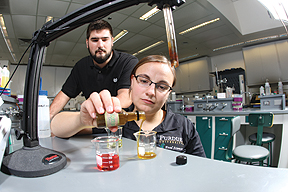Purdue Extension helps small businesses establish themselves
February 6, 2013
 |
|
Katie Clayton tests food products for
entrepreneurs like Brad Niemeier (in background) who want to sell at farmers
markets and other venues. Clayton, a Purdue Extension food science outreach
specialist, conducts pH and water activity tests to make sure products are safe
from bacteria. After making some adjustments in the proportion of ingredients,
Niemeier received the green light to bottle Azzip sauce developed for his new
pizzeria. (Purdue Agricultural Communication photo/Tom Campbell)
|
Brad Niemeier counts himself among the many entrepreneurs starting a new business that Purdue Extension helped to get off to a strong start.
"I never knew this help was available," said Niemeier, a Purdue alumnus who is starting a new food business. "It's awesome to have this resource. I got so much out of my time here as a student. Now, Purdue is still giving back to me."
Niemeier is referring to a Department of Food Science outreach program that helps fledgling food entrepreneurs like him make products safe from bacteria. It is just one of the many ways in which Purdue Extension assists businesses across Indiana with programs offering services that enable them to succeed.
Niemeier turned to his alma mater last summer when he prepared to bottle Azzip Sauce, a spicy pesto sauce developed for his new pizzeria. To meet FDA regulations, shelf-stable food products must be below a certain level for pH (acidity) and water activity to prevent growth of microorganisms.
"We test pH and water activity to make sure products meet food safety regulations," says Katie Clayton, food safety Extension outreach specialist.
"Katie and Steve Smith (director of the food science pilot plant that tests products) walked us through all the steps," Niemeier says. "Our sauce wasn't acidic, but the water activity was right at the cutoff, so we discussed ways to lower it by changing the proportion of ingredients. After a few trials, we ended up with a product that tasted good, looked good and was at the right activity level."
While this outreach effort works to get food enterprises to the marketplace, another Purdue Extension group is helping producers expand their market.
Demand for locally grown foods is on the rise, but many small farmers are unable to take advantage of opportunities because they can't readily tap into a variety of buyers and processing systems that would give them better access to markets.
Food hubs, which collect produce from area farms at a central location and then deliver it to customers, are among the fastest-growing models for increasing farm sales, says Roy Ballard, Purdue Extension educator in Hancock County. He leads a committee that is establishing a food hub serviced by seven central Indiana counties.
End customers can be a mix of consumers, restaurants, institutional clients such as schools and hospitals, wholesale brokers and even food banks.
The Central Indiana Food Hub may have a virtual hub running this spring. Sales are estimated at up to $1 million the first year.
More than half the producers surveyed during a feasibility study reported a strong interest in adding value to their operations by diversifying and in bringing family members into their farms.
"Our goal is to go as close to year-round as possible, by preserving crops in season for later sales and producing more customer-ready products," Ballard says. "Instead of just having sweet corn in the summer, then we can flash freeze it and have it available for schools."
For producers who grow predominantly for farmers markets, this could increase their capacity and allow at least one person to stay on the farm full time.
The complete story of how Purdue Extension helps fledgling businesses is available at https://ag.purdue.edu/agricultures/Pages/Dec2012/The-Ins-and-Outs-of-Business.aspx.
Writer: Olivia Maddox, 49-63207, maddoxol@purdue.edu
